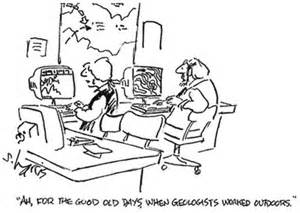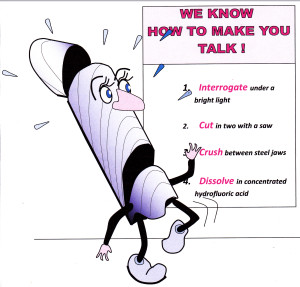The camera and the interrogator
How odd it is that anyone should not see that all observations must be for or against some view if it is to be of any service. Charles Darwin, 1870
Speak to exploration geologists and you will find two views about what a geologist should do when observing outcrop or drill core in the field. Some seek to be unbiased objective recorders of what they see. Others constantly theorize about what they might expect, construct many possible scenarios or hypotheses, and ask questions of the rocks to help choose between them. I characterize these two viewpoints as the geologist-as-camera, and the geologist-as-interrogator.
Geologist as camera – 1
I arrive at the exploration site to find a team of three young geologists engaged in making a geological map of their property. Using GPS, they walk predetermined traverses spaced 400m apart. They each aim to average 8km in a day and, between them, by taking alternate lines, they will cover a huge swathe of country before their next field break[1] . Observations on each geological feature identified along the line of march are logged into a Tuff Book Laptop by going through a series of pull-down menus and clicking the boxes on pre-determined questions. The geologists have only the most vague ideas about the geology of the property they are mapping. Two of them have never thought much about this: the brightest of the three specifically rejects the notion of understanding her observations: she sees herself as an unprejudiced, objective observer – confirmation bias is not for her. Eventually all this data will be computer-plotted on a map as a linear sequence of point observations. Another more senior geologist[2] will eventually produce a geological map by joining up the dots. Probably there is a software program that can do much of this task for him (or her) and thus obviate the need for too much thought or hard work.
Is this the future of Geological mapping in the 21st Century?
Geologist as Camera – 2
I travel to an exploration site on the other side of the country. Here, a much larger company is drilling out a substantial metal deposit. Four diamond drill rigs are going 24/7 and have reached hole number 247. There is a backlog of several kilometers of core stacked on pallets waiting to be logged. Four geologists are hard at work logging core laid out on racks in a big shed. As geologists come and go on field break, or come and go through resignations and new hires, it seldom happens that any one hole is logged in its entirety by the same person. They log on to analytical spread sheets in laptop computers using pre-determined menu options. They have never seen a geological Section of the prospect (there are none). There are no detailed geological maps or level plans. The geological model, such as it is, was produced a year before by an outside consultant who spent ten days on site. Attached by umbilical to a computer in the office is a specialist Ore Reserve Geologist who mostly ignores the gargantuan data base of geological observations (it’s too hard) and calculates a resource on assay data, virtual reality 3D string models and geostatistical techniques. The geologists slaving in the core yard mostly do not care – their job as 100-meter-a-day core-logging operatives is intensely boring – they work as automata and count the days till their next field break, or until they have earned enough money to find some other more intellectually-stimulating employment.
Driving a taxi, perhaps?
Is this the future of core logging in the 21st Century?
These are fictitious projects based on observations of many actual projects, with many companies in different countries and continents over many years. The geologists I describe are not to blame. In many cases it is their first job, they are on short-term contracts, and they are doing what their employer asks and expects of them. They probably wonder what the point was of much of the time they spent learning at University.
The problem with the approaches I have described above is that the geologists believe the essence of their job is the conversion of light signals from their eyes into digital feed for the computer. A kind of biological digital camera. Without a pre-existing context in their brain, each observation they make is of equal importance, each pixel of equal weight.
I don’t know the answers to my rhetorical question, but fear they might be affirmatives. The geologist-as-camera view is becoming increasingly common and in my experience has generally been disastrous for geological understanding. Without a good geological map drill holes will be put in the wrong place. Without a good geological model of a deposit the certainty required to convert an Ore Resource into a Proven Reserve cannot be achieved.
There is a better way.
The geologist as interrogator
All observation is made in a particular context. The context which should guide the exploration geologist is a matrix of different competing theories about the true nature of the geology being observed. This context provides the questions that must be asked of each outcrop or piece of drill core. It defines the search strategy to be followed. It is the search for critical observations that will allow selections between multiple working hypotheses to be made. Important observations are thus prioritized and not lost in a sea of trivial observation. Observation is not about the quality of eyesight, but about the quality of brain and preparedness to use it. Observation made to test a hypothesis is biased observation, but the bias is up-front, acknowledged and constantly revised in the face of evidence. Bias can be a good thing. Without bias, there is no way of separating signal from noise – not even by using the most significant of statistical procedures. But note: this is a quite different kind of bias from the one that seeks only evidence that will confirm a single pre-existing theory, and ignores or explains away any evidence which does not.– that is Confirmation Bias and is rightly condemned. Anyone who claims to be unbiased merely lacks self-awareness. Their biases are unconscious or lie in the unstated biases of whoever drew up the detailed procedure manual which they are slavishly following.
Interrogating your drill core
The correct metaphor for this approach is the geologist as an interrogator of each rock exposure, asking a series of relevant questions that come from his/her views as to what might be happening.
The true nature of scientific investigation is focused observation guided by emergent theory. This is a long established and respectable idea. It contrasts with seeking to find your theory in your data (3), after you have completed your observations. Collecting data should not be used as a fishing expedition: its purpose is to provide evidence to chose between hypotheses. It follows that the hypotheses come first. Seeking your hypothesis in your results is however such a widespread an error that a special term HARKing - it is an acronym for Hypothesizing After Results are Known. In statistics-based research the same error is known as “p-hacking”. These are surprisingly widespread errors.
A colloquial analogy for this method of doing science is the “Texas Sharpshooter” : the Texan draws his revolver and directs a hundred shots towards a distant barn door. He then selects the best grouping of six from the impacts on the door and carefully draws a target around them. He takes a photograph and uses it to establish his sharpshooting credentials.
Here are some quotes from various scientific fields to reinforce my point:
In Biology:
How odd it is that anyone should not see that all observations must be for or against some view if it is to be of any service. Charles Darwin, 1870
In Fundamental Physics:
We never draw inferences from observations alone, but observations can become significant when they reveal deficiencies in some of the contending explanations. David Deutsch, The Fabric of Reality, 1998.
In the Philosophy of Science:
The facts that we measure or perceive never just speak for themselves but must be interpreted through the coloured lens of ideas…. We can no more separate our theories and concepts from our data than we can find a true Archimedean viewpoint – a God’s eye view – of ourselves and the world. Michael Schermer, Scientific American, 2007
In Medical Research:
..you cannot find your hypothesis in your results. Before you go to your data…you have to have a specific hypothesis to check. If your hypothesis comes from analyzing your data, then there is no sense in analysing the same data again to confirm it. Ben Goldacre, Bad Medicine, 2008.
In Psychology
I am more and more convinced that the only way to obtain clear answers from Nature is to ask her clear questions. Eric Jan Wanamakers, 2014 www.ejwanamakers.com
[1] Every 8 days: it’s in their Contract.
[2] Senior enough, at least, to avoid having to do any field work.
(3) Sherlock Holmes is often approvingly quoted: “it is a capital mistake to theorise before one has data”. Holmes (or rather Arthur Conan Doyle) could not have been more wrong: the exact opposite is the case.
